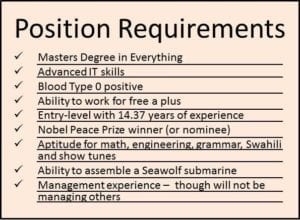Companies Should Remain Flexible on “Requirements”
rw-admin | 05/23/2017
The established trend of a candidate-driven market has forced companies to examine and implement alternative tactics to attract desired talent. The demand for highly skilled employees is so great, that thinking outside of the box is no longer a luxury but a necessity in terms of recruiting and hiring strategies. One unconventional practice and one that tends to present a major road block when recruiting is the idea of considering candidates with less than exact experience or skills. Job descriptions/ position profiles have become so narrowly defined and precise in terms of experience, training, education, credentials and requirements that many good, potential candidates are immediately disqualified.
Hiring managers have a difficult time agreeing to forego a desired skill on paper and therefore end up with few or no people to interview. Given the greatly diminished pool of active job seekers, and the increase in available jobs, overcoming this obstacle can greatly improve the odds of filling these positions. Companies need to ditch the old school check list of requirements and be more open minded.
I spoke with Joachim Woerner, The Q Works Group Managing Director, about his experience as an executive recruiter in terms of stringent position requirements and how it affects the overall outcome of making a successful placement. The main takeaway was that in the current employment market, when demand outweighs the supply of qualified job seekers, companies may need to make adjustments on the hardline skills/ education requirements to fill a position.
Ideally, the recruiting process will flow effortlessly with the client providing “must have” requirements, and the executive recruiter having no trouble head hunting perfect candidates. However, we know that this is not always the case and that is why it is important that companies realize upfront that they may need to revise their checklist of requirements or at least prioritize them.
Sometimes unrealistic expectations are immediately evident to the recruiter due to their extensive industry knowledge. Other times, with a little research it will become clear and if not, within 2 weeks a good recruiter will have a respectable grasp on what job seekers expect and will accept for that given position.
Mr. Woerner faces this issue with clients on a regular basis. The key to overcoming this obstacle is to address it early in the conversation between the client and recruiter. When given a job description, a good recruiter will know pretty quickly if they will not be able to source candidates in the marketplace due to unrealistic requirements such as:
- Compensation is too low
- Experience level is too high
- Relocation is not offered or not acceptable
- Very specific, narrowly defined industry skills or knowledge is required
 Any of the four requirements listed above can be negotiated. If a client wants someone with 10 years’ experience for $70,000., but the reality is that people with that number of years’ experience are actually making $95,000 – then it is clear that the recruiter will not be successful unless revisions are made. Another example is if a client is seeking to hire someone with advanced industry knowledge, something very specific and there are no job seekers available that fit that niche, but there are candidates with similar, transferable skills (from say a different industry) – then this is a concession that may need to be made.
Any of the four requirements listed above can be negotiated. If a client wants someone with 10 years’ experience for $70,000., but the reality is that people with that number of years’ experience are actually making $95,000 – then it is clear that the recruiter will not be successful unless revisions are made. Another example is if a client is seeking to hire someone with advanced industry knowledge, something very specific and there are no job seekers available that fit that niche, but there are candidates with similar, transferable skills (from say a different industry) – then this is a concession that may need to be made.
When companies get hung up on the level of experience or education they feel is necessary to successfully manage a position, they overlook other values or softer skills that a candidate may bring to the organization. Here are a few examples of the types of skills that can be applied to many different jobs across many different industries:
| Problem Solving | Computer Skills | |
| Adaptability | Project Planning | |
| Collaboration | Attention to Detail | |
| Strong Work Ethic | Higher Mathematics | |
| Time Management | Communication Skills | |
| Critical Thinking | Ability to Learn | |
| Self-Confidence | Easily Process Information | |
| Handling Pressure | Analyze Data | |
| Leadership | Ability to Influence/ Sell | |
| Creativity | Research Skills |
Again, in the perfect scenario, new hires will possess all of the required skills, education and experience deemed important to the client. But with the unemployment rate so low and the number of new jobs being created, companies must come to terms with the lack of available job seekers in the market. Accepting that not all requirements may be checked off the list allows the recruiter the opportunity to uncover hidden gems that clients may not have otherwise considered. Being open minded, weighing all things involved and considering candidates that may not fit the profile 100% will greatly improve the odds of filling the position successfully.
The bottom line is what does it really take to do the job? If there are experience or skill deficiencies, what can employers do in terms of training and onboarding to close these gaps? As one client recently shared with us, he would much rather hire a motivated, growth oriented individual, versus someone that has more experience but has also peaked in their career. Top quality employees can always learn as long as the company is willing to invest in them.
Written By: Angie Barnes, The Q Works Group

